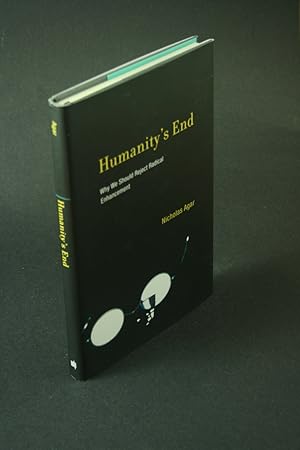Agar Nicholas 1964 (1 results)
Product Type
- All Product Types
- Books (1)
- Magazines & Periodicals
- Comics
- Sheet Music
- Art, Prints & Posters
- Photographs
- Maps
-
Manuscripts &
Paper Collectibles
Condition
- All Conditions
- New
- Used
Binding
- All Bindings
- Hardcover
- Softcover
Collectible Attributes
- First Edition
- Signed
- Dust Jacket
- Seller-Supplied Images
- Not Printed On Demand
Seller Location
Seller Rating
-
Humanity's end: why we should reject radical enhancement.
Published by Cambridge, Mass.: MIT Press, 2010, 2010
Seller: Steven Wolfe Books, Newton Centre, MA, U.S.A.
First Edition
like new dust-jacket, like new book but with remainder marks. black remainder dot on bottom foredge, letter T in marker on top foredge. AGAR, NICHOLAS. Humanity's end: why we should reject radical enhancement. Cambridge, Mass.: MIT Press, 2010, 1st printing number line ending in 1, viii, 219pp., . Series: Life and mind. - "Arguments against radical enhancement have too often in the past been characterized by irrationalism and mysticism. Nicholas Agar presents the first cogent case for the rationality of opposing radical enhancement. Moving easily between science and philosophy, he argues for a species-relative conception of valuable experiences, according to which we have a strong reason to remain human. This central claim is bolstered by a host of other arguments, which will ensure that Humanity's End will become a central reference point for debates over the desirability of radical enhancement."--Neil Levy, Oxford Centre for Neuroethics" "Nicholas Agar has written an excellent introduction to the moral challenges of our transition to a posthuman future, engagingly told by contrasting the work of four very different transhumanists. Humanity's End joins Agar's Liberal Eugenics on the must-read list for those interested in the future of the human race.-James J. Hughes, Executive Director, Institute for Ethics and Emerging Technologies" "Proposals to make us smarter than the greatest geniuses or to add thousands years to our life spans seem fit only for the spam folder or trash can And yet this is what contemporary advocates of radical enhancement offer in all seriousness. They present a variety of technologies and therapies that will expand our capacities far beyond what is currently possible for human beings. In Humanity's End, Nicholas Agar argues against enhancement describing its destructive consequences.", "Agar examines the proposals of four prominent radical enhancers: Ray Kurzweil, who argues that technology will enable our escape from human biology; Aubrey de Gray, who calls for anti-aging therapies that will achieve "longevity escape velocity"; Nick Bostrom, who defends the morality and rationality of enhancement; and James Hughes, who envisions a harmonious democracy of the enhanced and the unenhanced. Agar argues that the outcomes of radical enhancement could be darker than the rosy futures described by these thinkers. The most dramatic means of enhancing our cognitive powers could in fact kill us; the radical extension of our life span could eliminate experiences of great value from our lives; and a situation in which some humans are radically enhanced and others are not could lead to tyranny of posthumans over humans." - CONTENTS: What is radical enhancement? -- Radical enhancement and posthumanity -- The technologist : Ray Kurzweil and the law of accelerating returns -- Is uploading ourselves into machines a good bet? -- The therapist : Aubrey de Grey's strategies for engineered negligible senescence -- Who wants to live forever? -- The philosopher : Nick Bostrom on the morality of enhancement -- The sociologist : James Hughes and the many paths of moral enhancement -- A species-relativist conclusion about radical enhancement. ISBN 9780262014625.


